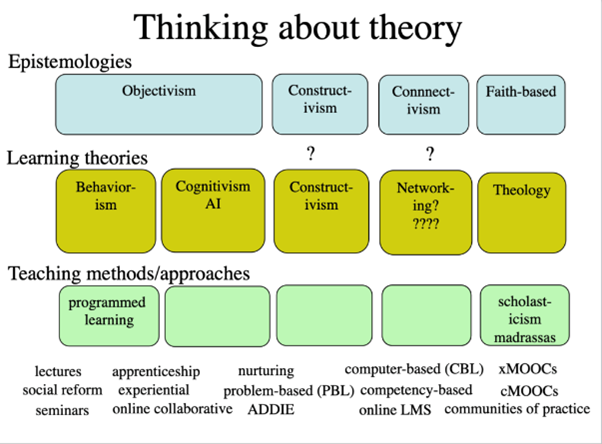11. Summary

I have chosen just a few epistemological approaches that influence teaching and learning, but I could have chosen many others. Theologies reflect another epistemological approach, based on faith. Elements of scholasticism can still be found in elite universities such as Oxford and Cambridge, particularly in their tutorial system.
It can be seen then that there are different epistemologies that influence teaching today. Furthermore, much to the consternation and confusion of many students, teachers themselves will have different epistemological positions, not just across different disciplines, but sometimes within the same discipline. For instance, subject areas such as psychology and economics may contain different epistemological foundations in different parts of the curriculum: statistics is validated differently from Freudian analysis or behavioural factors that influence investor behaviour.
Epistemological positions are rarely explicitly discussed with students, are not always consistent even within a subject discipline, and are not mutually exclusive. For instance a teacher may deliberately choose to use a more objectivist approach with novice students, then move to a more constructivist approach when the students have learned the basic facts and concepts within a topic through an objectivist approach. Even within the same lesson, the teacher may shift epistemological positions, often causing confusion for students.
At this point, I’m not taking sides (although I do a favour, in general, a more constructivist philosophy). Arguments can be made for or against any of these epistemological positions. However, we need to be aware that knowledge and consequently teaching is not a pure, objective concept, but driven by different values and beliefs about the nature of knowledge.
Arguments are also being made today that academic knowledge is now redundant and is being or will be replaced by networked learning or more applied learning. I have made the case though that there are strong reasons to sustain and further develop academic knowledge, but with a focus as much on the development of skills as on learning content.
Different theories of learning reflect different positions on the nature of knowledge. With the possible exception of connectivism, there is some form of empirical evidence to support each of the theories of learning outlined in this lesson. However, while the theories suggest different ways in which all people learn, they do not automatically tell teachers or instructors how to teach. Indeed, theories of behaviourism, cognitivism, and constructivism were all developed outside of education, in experimental labs, psychology, neuroscience, and psychotherapy. Educators have had to work out how to move from the theoretical position to the practical one of applying these theories within an educational experience. In other words, they have had to develop teaching methods that build on such learning theories.
The next lesson examines a range of teaching methods that have been developed, their epistemological roots, and their implications for teaching in a digital age.
